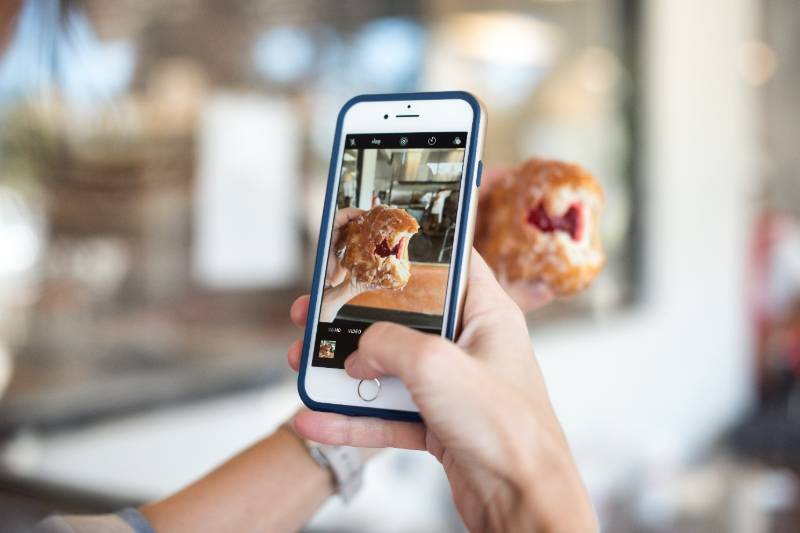How to open a bakery: Everything you need to know
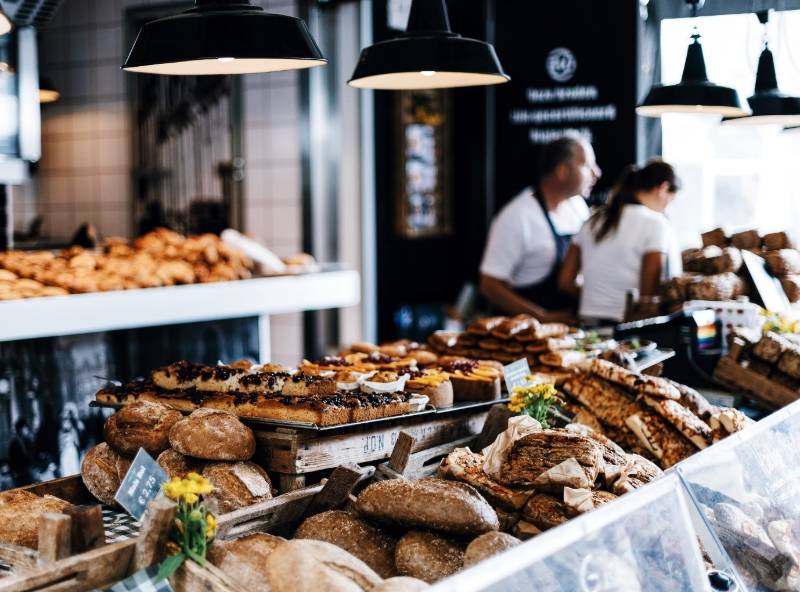
Have you always wanted to open a bakery? If you’re always wowing friends and family with your fabulous cakes, or you’re a dab hand at making your own doughnuts, you might just be able to turn your talents into a fully-fledged business venture.
The retail baked goods industry is currently growing at 2% per annum, rising to 5% for artisanal baked goods, according to the Craft Baker’s Association, meaning currently there’s a sizeable market out there for your bakes.
If you’re willing to work very hard (and you don’t mind the early starts that often come with this sort of job) then running your own baked goods business could be the sweet life for you. In this guide, we’ll show you how to open a bakery, including:
- Finding your niche
- Getting started: writing a business plan
- How much does it cost to start a bakery?
- Rules, regulations and licencing
- Training and qualifications
- Equipment: What you’ll need to set up your kitchen and serve food
- Branding and marketing tips
Finding your niche
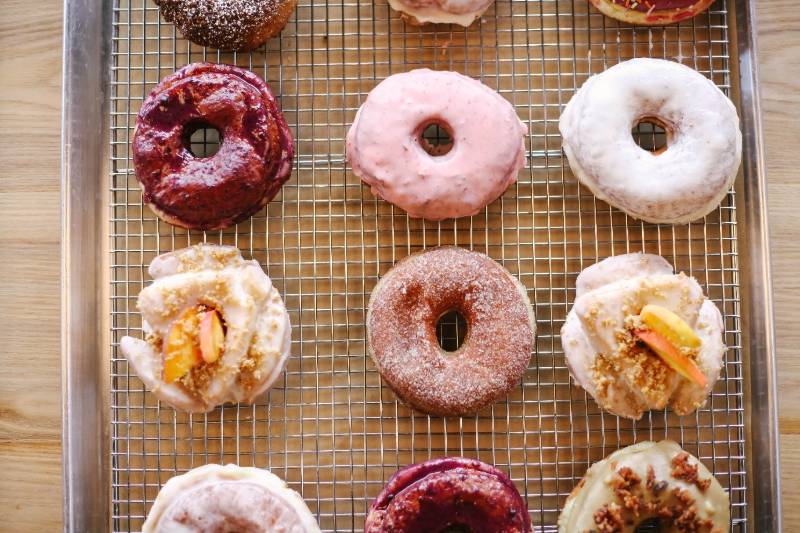
First things first: what sort of bakes are you planning to sell? Before you make plans to open a bakery, you’ll need to decide what products to focus on, and how you’re going to make your creations stand out from the crowd. Is there a particular product you can make to a higher standard than anyone else out there?
If you’re just starting out, it’s best to start small with a simple product offering. Our advice would always be to focus on your passion and lean into your talents — this will ensure you’re producing the best product you possibly can. So, whether you’ve got a real knack for decorating cakes or baking the best sourdough loaf, pick a specialism and channel your energy into it.
You don’t necessarily need to just focus on one thing, though. Many businesses offer a range of different baked goods, but also have a few flagship items that set them apart from the crowd. For instance, some bakers decide to make organic, high-quality ingredients their USP, or offer bakes for specialist vegan or gluten-free diets. By catering to a particular audience, you can give your bakery business a competitive edge.
Researching a location: is there a demand for your business in your local area?
There’s not much point setting up shop in a part of town where there won’t be a market for your baked goods, so conduct some research into your chosen location to get an idea of what the average customer might be looking for. Likewise, if you plan to supply your baked goods to other local businesses — like providing bread for a café or restaurant, for example — you’ll need to establish whether there’s enough demand in your area.
It will also help to carry out a bit of research on nearby competitors. For instance, you’ll be making your job a lot harder for yourself if you open up a vegan cupcake shop when there are a few similar businesses already operating nearby. Similarly, a café bakery offering pastries and coffee might well thrive in a commuter district, but not if the area is already saturated with competitors and it doesn’t offer them anything new. So, do your research and pick a product that suits the local demand.
Your bakery business plan

Once you have an idea, it’s time to put pen to paper and create a bakery business plan. This is a comprehensive plan of action for setting up your bakery, and should cover every aspect of your business, including:
- The products you’ll serve.
- Your business model (you can find more details on this below).
- Your budget.
- The venue.
- Funding.
- A pricing strategy (you can read more about this below).
- Branding.
- Marketing and promotion.
- Your website and online presence.
- Plans for hiring staff (if any).
- How you plan to develop and grow the business.
You’re going to rely on your bakery business plan a lot during the first few years, and you’ll most likely need to show it to investors or lenders when seeking finance, too. So, make it as thorough and detailed as possible.
Your business model
There are several different business models for a bakery. As part of your business plan, you’ll need to identify which type you want yours to be.
Coffee shop bakery
In addition to a production kitchen where you’ll whip up your treats, this type of business also has a front of house counter and seating area where customers can enjoy their baked goods along with a hot drink. Serving beverages — both to sit-in and takeaway — is a great way to supplement the income you’ll make from your bakes. But, this type of café does require a larger upfront investment, and you’ll also need front of house staff to serve customers and make drinks, which will increase labour costs.
Retail bakery
In a retail bakery, you’ll have a full production kitchen as well as a counter where customers can buy goods to takeaway. Food isn’t consumed on the premises, which means this sort of business can operate under an A1 retail licence — see our licencing section for more information on this. If you make products to order, this also is where customers can collect the finished goods. There’s no need for a seating area helping to keep the cost of the venue down.
Wholesale bakery
A wholesale bakery supplies baked goods to local businesses, restaurants, and cafés, and may also sell at markets. There’s no customer-facing unit, and there’s no need to employ front of house staff, which keeps costs down. However, to meet commercial demand, you’ll probably need to be able to mass-produce lots of products in a short space of time, so you may need to invest in more machinery and equipment. You’ll also need to spend time building relationships and securing deals with local businesses.
Home bakery
Many bakers will kickstart their business by operating from their own home kitchen, at least to begin with. This is great for bakers who want to start their company on a smaller budget, as you won’t need to pay for a new venue. If you’d prefer to set up a baking company this way, take a look our guide to starting your own catering business from home.
Pricing your products
One of the most essential parts of writing your bakery business plan is to draw up a pricing strategy for your products. This will help you to set a budget and will give you an idea of how much revenue you need to be generating to cover the other costs of running your bakery.
When designing a pricing strategy, you need to consider the cost of the ingredients used as well as the time and labour required to make your products. You should also add a little extra to go towards the cost of your venue, your equipment, and the time that you spend working on the marketing and administrative aspects of your business. This will help to ensure that these operational costs don’t eat into your profits.
Additionally, you also need to be savvy about how much your potential customers are willing to pay for your product. That means you’ll need to think about the income of people in your chosen location — is it an affluent area, and are the people there going to be interested enough in your product to part with their cash? Looking at how your competitors are pricing their products will help to give you an idea, too.
If you want to give your business a competitive advantage, it’s a good idea to undercut the prices of your nearest business rivals, at least to begin with. Assuming your products are tasty enough to keep your customers coming back for more, this will help to attract customers and secure their loyalty as you get your bakery off the ground. Then you can adjust prices after you’ve built up a customer base. Just be sure that your pricing includes a profit margin, so you aren’t operating at a total loss.
How much does it cost to start a bakery?

It takes quite a substantial upfront investment to start a bakery, although the good news is that costs do tend to be lower in this industry than for other types of catering business, like cafés or restaurants.
Many people choose to fund their bakery using a business loan, or by drawing from their own private savings. But, before you can apply for funding, you’ll need to sit down and work out how much you can afford to borrow or spend, and then set a budget for every aspect of your business.
In this section, we’ll break down the costs to help you design your budget. To be on the safe side, you may want to consider being generous with your estimates, as you’re likely to encounter a few unexpected costs during the first few months and this will help to cushion your losses.
Licencing and legalities
Cost estimate: £500–£1000
Before you can start serving food to the public, there are various licences you’ll need to get. Depending on what your venue was used as previously, you may also need to apply for a change of use class. You can read more about the legal side of opening a bakery in our guide to the rules and regulations section.
Venue
Cost estimate: £1000–5000 per month to cover the rent or mortgage, depending on size and location.
Your venue is likely to be the most expensive aspect of opening a bakery, although exactly how much you’ll need depends on the size and location of your chosen premises. Don’t forget that there will be costs for conveyancing or for a solicitor to oversee the leasing process, too. Typically, these will run from around £400–£1500, depending on the length and scale of the work needed.
Renovation and store front
Cost estimate: £200 minimum
Unless you’re buying or letting a former bakery, it’s likely that you’ll need to make a few changes to your chosen space. Naturally, the cost of this will depend on the amount of work needed, so survey your venue and ask for quotes from any tradespeople to get a better idea of the exact figure. At the very minimum, you’ll need to spend a couple of hundred pounds on signage for the exterior.
Equipment
Cost estimate: £3000–£6000
The kitchen is where the magic happens, so you really can’t afford to scrimp on this part! The exact figure will depend on the scale of your business, and how many different food products you plan to make each day.
You should be able to set up a bakery kitchen with the essentials — like a fridge, oven, mixer, and some industrial baking equipment — for around £3000, although you’ll probably need to reinvest in more equipment as your business grows. If you’ll be making specialty items that need more specialised equipment, like doughnuts, this figure will probably be higher.
If you’re opening a coffee shop bakery, you’ll also need to allow for an espresso machine, which will usually set you back around £1000–£2000, depending on the model and size. You’ll also need some tables and chairs.
If you’re starting a bakery completely from scratch, it will cost a lot more than if you’ve got some of the basic equipment already or have been running a small bakery business from home. Skip ahead to our equipment section to read more about exactly what you’ll need.
Remember, spending more on larger equipment often means you can make more products in less time, which means it may be worth the initial investment. As quality equipment will make better food and is more likely to last for longer, it may be beneficial to ultimately spend a bit extra to make a real difference in the long term.
Raw ingredients
Cost estimate: £500-£2000
We would recommend setting aside a portion of your budget to spend on the ingredients you’ll need during the first few weeks. Having these in stock will save you time when you’re rushed off your feet.
Marketing and media
Cost estimate: £300–£700
People often forget to build a marketing budget into their plan, but a website and advertising are essential. So, you should set aside some money to cover the cost of designing a website, printing some business cards, and establishing an online presence after opening. You can escalate this spending as your business grows.
Rules and regulations
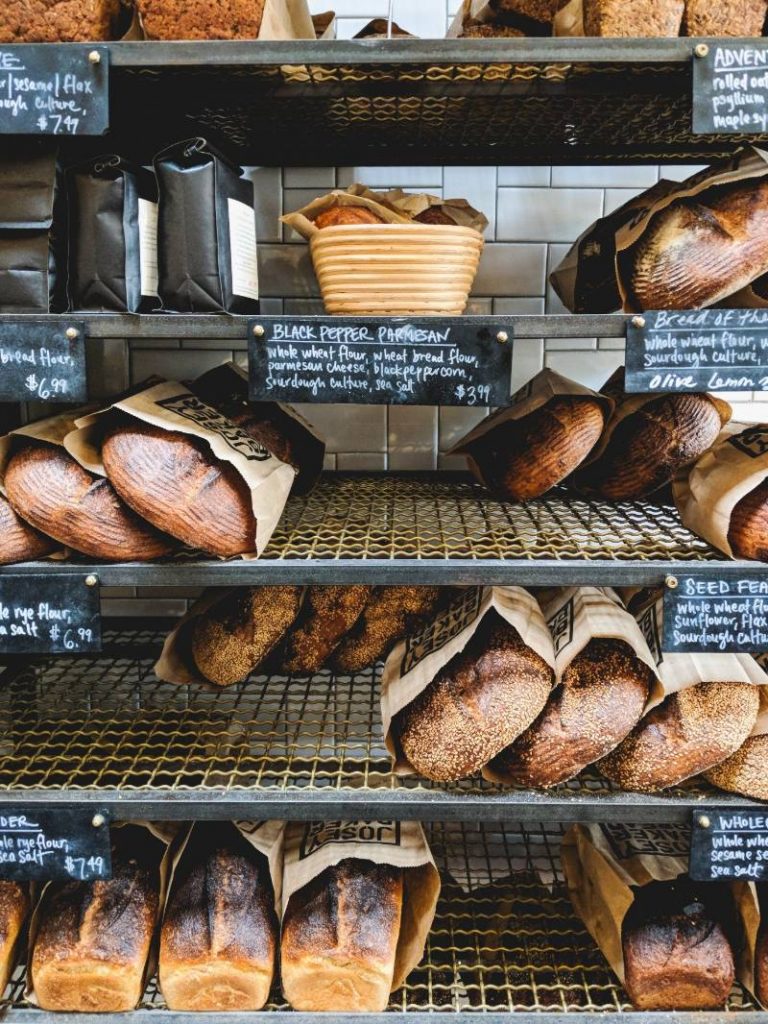
Just like any other commercial food business, there’s a few regulations you’ll need to satisfy before you can open up shop and start serving your confections to the public. While these can seem complicated at first, the rules surrounding a bakery tend to be less complex and prescriptive than they are for say, a restaurant, so long as you take care to follow all the necessary steps, you’re not likely to run into trouble.
In this section, we’ll guide you through the planning permissions, licencing, and food hygiene rules you’ll need to follow.
Licencing
All food businesses need to register with the local authority to serve food to the public. If you use eggs or dairy on site, you’ll also need a food premises licence. Depending on the specifics of your menu, the council may also need to carry out an inspection before they grant you a licence.
However, the application process is quite straightforward, and you are quite likely to be accepted. You’ll need to apply at least 28 days before you plan to open to the public, however, so don’t leave it until the last minute.
If you plan to play music in your bakery (whether it’s in the front of house area or in your production kitchen) you’ll need a music licence, which can be obtained from the PLS PRS.
Use classes
All buildings have use classes. These are categories that describe the sort of activity the building is used for. A bakery will usually fall under class A1 (retail) or A3 (café or restaurant), depending on how you plan to operate your business. If you plan to operate on a takeaway-only basis, you can use a site with A1 classification. If you want to serve your customers food and drink to sit in then you’ll need to make sure your chosen venue has A3 classification.
It is possible to apply to change the use class if you find a venue you like that’s currently not in the correct use class, provided that you obtain permission from the Local Planning Authority. If you’re letting the property, then you need to seek permission from the landlord first.
Whether or not you’ll be granted permission for a change of use can be tricky to predict, as there are lots of variables that the council will need to consider before making a decision. The location of your venue can have a big impact, as the local authority will often designate particular streets or neighbourhoods as a ‘policy area’ depending on what sort of businesses they want to encourage to open there. This is why certain cafés and coffee shops — and especially big chain franchises — will sometimes be permitted to operate under A1 retail class, despite technically breaking the terms of the use class.
Given that permissions can vary so drastically, it’s best to discuss your options with your local council after you’ve found a venue that you’re interested in.
Food hygiene and safety
Food hygiene standards are overseen by the Food Standards Agency (FSA), and are — quite rightly — very stringent. Ensuring that your food preparation, storage, and serving methods are hygienic will protect your customers, safeguard your reputation as a business, and even help to ensure the quality of your food.
The FSA will inspect your business in order to determine whether it meets their standards, so you should follow their official guidelines to make sure your bakery is up to scratch. You can also take a look at our guide to commercial food hygiene to learn more about this important topic.
In any commercial food business, the safety of you and your staff is also very important. While running a bakery might not sound like the most dangerous job in the world, there are still a number of risks unique to this industry, like flour dust, hot equipment, machinery, heavy objects. As a business owner, you’ll need to take steps to make sure that safety standards are followed — especially if you’ll be hiring staff, as you can’t supervise them for every second of the day. The Health and Safety Executive has a helpful resource about safety in commercial bakeries, so take a look to learn more.
Training and qualifications
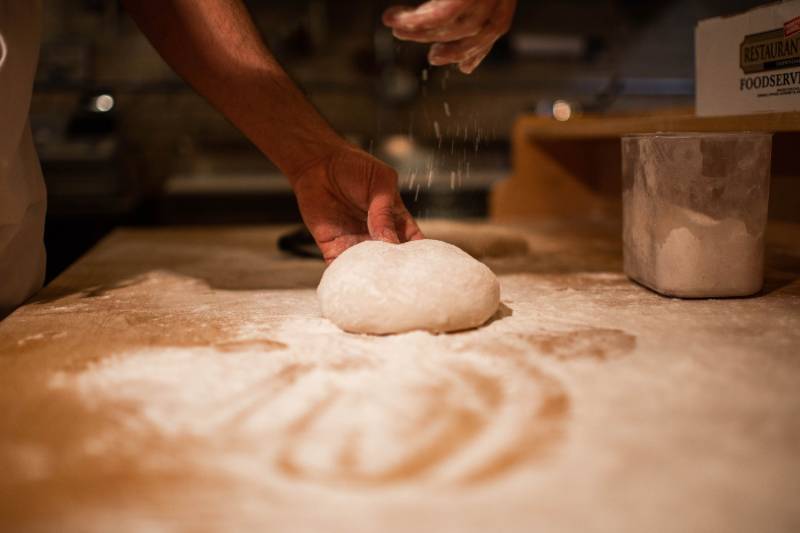
You don’t need any formal qualifications to own and run a bakery, but that doesn’t mean it’s not a good idea to learn a few basic skills and get a bit of experience first. Even if you’re already a star baker or plan to hire some talented staff to tackle the work for you, this would give you a good grounding in the processes of a professional bakery environment, which will be invaluable when you’re managing your own place.
Using professional quality equipment is also rather different to cooking at home in your own kitchen so if possible, you should certainly try to get some practical experience working in a production bakery. We’d also recommend that you and any staff you employ take a course in food hygiene and handling, too.
Bakery Equipment
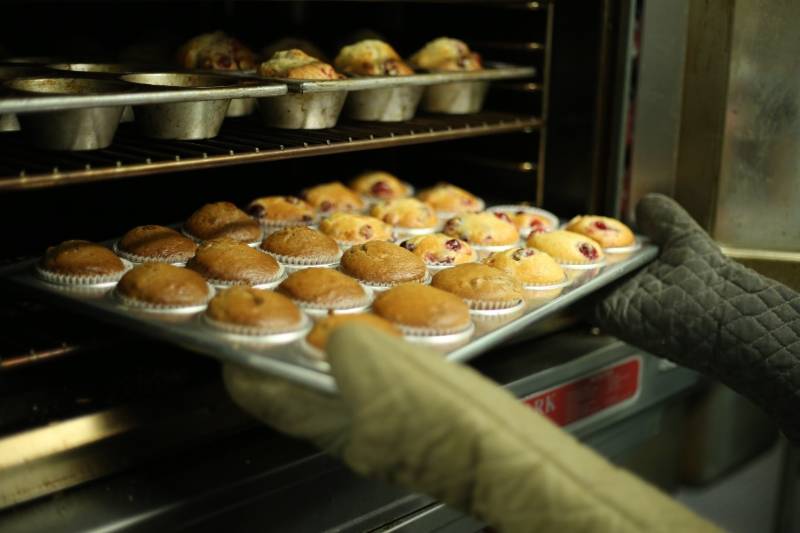
To get your bakery kitchen up and running, you’ll need the following essential equipment:
- Commercial oven: In any bakery, the oven will be the powerhouse of the kitchen, so you should definitely prioritise your spending on this. Convection ovens tend to be the best type for most bakers, as the temperature is consistent throughout. If you’ll be baking lots of bread or pastries in batches, you will probably need to consider a larger, more expensive oven.
- Microwave: This can also be very handy when you need to soften lots of butter or margarine for your bakes.
- Fridges: You’ll need a place to store your raw ingredients. If you also store your freshly made cakes or bakes in the fridge, remember that these should ideally have their own separate fridge where they can be stored away from ingredients.
- Stand mixers: It’s essential to have at least one stand mixer in your kitchen. Depending on the scale of your business, you may need more than one.
- Dough mixer: If you bake bread or any other products that use dough, then a mixer is essential, and will save you a lot of kneading.
- Blenders and processors: A food processor will save you a lot of work when mixing your toppings and fillings.
Bakeware, tools and accessories
As any baker worth their salt knows, you need an arsenal of all sorts of tins, trays, and tools to make a picture-perfect cake or pastry. Exactly what you’ll need depends on your product selection, but in this section, we’ll run you through the basics.
- Bakeware and cookware. You’ll need a good selection of loaf tins, baking trays and cake tins to suit your product selection.
- Measuring jugs and scoops, so you can get that recipe exactly right.
- Mixing bowls for whipping up batters, frosting, and fillings.
- Sieves for sifting ingredients.
- Rolling pins for biscuits, cookies and pastry.
- Piping bags for icing and decorating your creations.
- Racks and cooling trays. If you need to cool lots of items quickly, a stackable baking unit will make storage much easier.
- Pastry boards, cutters and brushes. A pastry board and cutter will make working with pastry much easier, and a brush will be useful for basting your creations before baking.
- A blow torch. While it’s not an essential, a blow torch can be used to add an impressive touch to a whole range of desserts, like meringues or brûléed tarts.
Drinks equipment
In a café-style bakery that serves hot drinks, you’ll need to invest in some beverage equipment. If you’re serious about serving the best coffee and don’t mind spending a fair amount of time making drinks (or you plan to hire a barista), then only an espresso machine will do.
If you’d like something a little less labour intensive but still makes a tasty cup of coffee, then a bean to cup machine might be more suitable. A water boiler will also allow you to serve tea much faster than using a conventional kettle.
Shop front or counter
In any kind of customer-facing bakery, you’ll need to get a counter. Many bakeries will have bespoke counters, but others will have a simple tabletop arrangement and display their creations in baskets or trays. If you’ll be serving cake by the slice, then some cake stands and display cases will help them to look their best. Chilled food items, like sandwiches, tarts, or cheesecakes, should be stored in a refrigerated counter display.
In a coffee shop-style bakery that serves food to sit-in, you’ll need a seating area with some comfortable tables and chairs. You want this area to feel inviting, so don’t forget to add some decorative touches, like artwork, or tabletop candles and plants.
Packaging
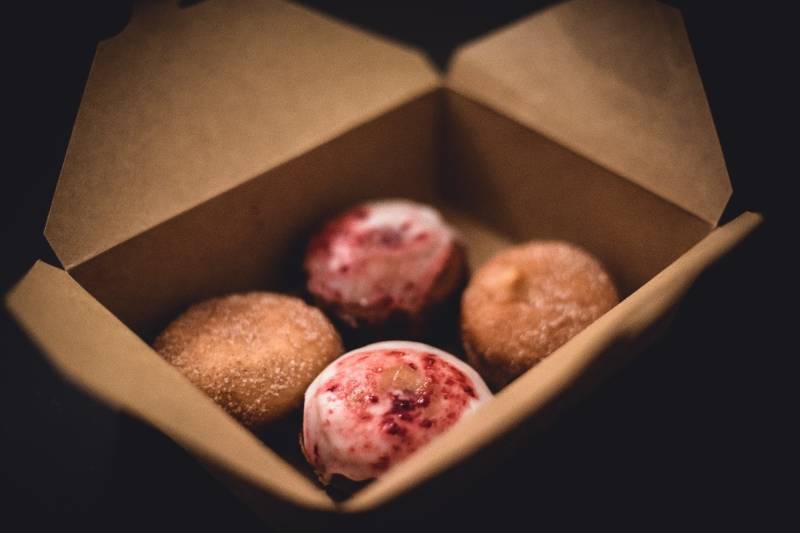
Most, if not all, of your baked goods will be served to go. That means you’ll need to have a range of disposable packaging options available to suit your products and keep them protected and safe until they’re ready to eat. Stock up on:
- Boxes: Cartonboard containers are great for serving delicate cakes or pastry items to go, as this will stop them from getting squashed.
- Cake boxes and carriers for larger orders.
- A selection of disposable food bags to suit different items. If you’re going to serve hot items to go, foil lined thermal bags will be a good addition. Baguette bags are also a convenient solution for longer sandwiches or loaves.
- Cups and lids in a range of sizes to suit different drinks, as well as cup carriers for large orders.
To learn more, check out our disposables buying guides, which will help you to find the best disposable products for your bakery.
Go eco-friendly
These days, we all want to do our bit for the planet, so why not go for recyclable containers and eco disposable cups? Opting for environmentally friendly packaging will show your customers you share their values, which can be particularly important if you’re hoping to attract an eco-conscious crowd with an interest in high-quality organic food.
Branding
Adding branded detailing to your packaging will help to give your bakery a cohesive and memorable brand identity. With disposables, you can add your logo to paper bags, boxes and even coffee cups using a stamp and ink pad.
Marketing and promotion
You can make the best bakes in the business, but if no one knows about your company, you’ll struggle to get any sales. Word of mouth can only get your so far, which is why it’s essential to set aside some time and allocate some of your budget towards marketing your bakery. Here, we’ve shared some tips and ideas that will help you to get the word out and attract customers.
Social media
Baking can be a very visual market, and how your products are presented is often just as important as how they taste. If you want to get the word out about your baked goods, then social media is a great way to do this, particularly image-centric platforms like Instagram. While you’ll need to dedicate some of your time towards it, most channels are free to use and can provide a great source of publicity. Take artful shots of your best bakes, and post consistently.
Make sure your social handles are included on your business cards and packaging so customers can find you online, too. If you’re willing to spend some extra money on your social media presence, you could also buy some adverts.
Facebook and Twitter can also be a great way to keep customers up to date with goings on at your bakery, so be sure to create a profile for your business. You can read more tips in our guide to promoting your food business on social media.
Design a website
Naturally, in the digital age, your business needs a professional website, so contact a designer and get one set up. If you make custom cakes to order, then a website with plenty of photographs is especially important, as customers will likely want to see examples of your work before they place an order.
Get listed on TripAdvisor and other review sites
Don’t think the likes of TripAdvisor, Yelp, and Foursquare are just for restaurants. Even the smallest bakeries can get listed on review sites, and, given that many potential customers will read up on a food business before they decide to pay a visit, it’s definitely worth getting yours listed. While you won’t be able to control what users say about your business, if you’re confident that your bakery offers exceptionally good products and great service, then before long you should have a few positive reviews to tempt in other potential customers.
If you’ve got a flair for baking, and you’re prepared to roll up your sleeves and work hard, you could just have what it takes to open a bakery. As long as you follow the steps we’ve laid out here, your business should be on course for sweet success! Plus, if you need any equipment when starting your bakery, be sure to check out our range of kitchen essentials to get you on your way.
Remember, you can find loads more tips and tricks for commercial caterers on our knowledge base. We also update our blog regularly, so be sure to check back to keep up with the latest industry trends and updates.




